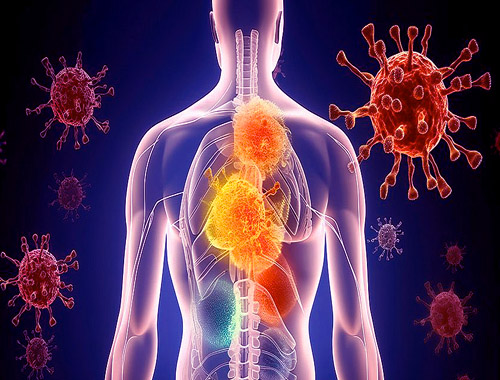Common variable immunodeficiency

Published: 18 Jun 2025
ICD9: 279.06 ICD10: D83.1 ICD11: 4A01.0Y
Common variable immunodeficiency (CVID) is a group of immune disorders characterized by low levels of antibodies (immunoglobulins), leading to increased susceptibility to infections.
Here's a breakdown of key aspects:
![]() Immunoglobulins (Antibodies): These are proteins produced by the immune system to help fight off infections. People with CVID typically have low levels of IgG, and often low levels of IgA and/or IgM as well.
Immunoglobulins (Antibodies): These are proteins produced by the immune system to help fight off infections. People with CVID typically have low levels of IgG, and often low levels of IgA and/or IgM as well.
![]() Vulnerability to Infections: The main consequence of low antibodies is an increased risk of recurrent infections. These most commonly affect the:
Vulnerability to Infections: The main consequence of low antibodies is an increased risk of recurrent infections. These most commonly affect the:![]()

![]() Respiratory tract: Sinusitis, bronchitis, pneumonia. These infections can become chronic and lead to lung damage (bronchiectasis).
Respiratory tract: Sinusitis, bronchitis, pneumonia. These infections can become chronic and lead to lung damage (bronchiectasis).![]()

![]() Gastrointestinal tract: Persistent diarrhea, abdominal pain, malabsorption (difficulty absorbing nutrients), and increased risk of inflammatory bowel disease-like conditions.
Gastrointestinal tract: Persistent diarrhea, abdominal pain, malabsorption (difficulty absorbing nutrients), and increased risk of inflammatory bowel disease-like conditions.
![]() Other Problems: Besides infections, people with CVID can also experience:
Other Problems: Besides infections, people with CVID can also experience:![]()

![]() Autoimmune disorders: Such as rheumatoid arthritis, immune thrombocytopenic purpura (ITP), autoimmune hemolytic anemia, and thyroiditis.
Autoimmune disorders: Such as rheumatoid arthritis, immune thrombocytopenic purpura (ITP), autoimmune hemolytic anemia, and thyroiditis.![]()

![]() Granulomas: Clumps of immune cells that can form in various organs, especially the lungs, liver, and spleen.
Granulomas: Clumps of immune cells that can form in various organs, especially the lungs, liver, and spleen.![]()

![]() Increased risk of certain cancers: Particularly lymphoma and gastric cancer.
Increased risk of certain cancers: Particularly lymphoma and gastric cancer.
![]() Cause: The exact cause of CVID is not fully understood. It's thought to involve a combination of genetic factors and environmental triggers. It's not considered a single genetic disease, but rather a collection of immune defects that all lead to the same endpoint: low antibody production. There are some identified genetic mutations that can contribute to CVID in certain individuals, but many cases have no known genetic cause.
Cause: The exact cause of CVID is not fully understood. It's thought to involve a combination of genetic factors and environmental triggers. It's not considered a single genetic disease, but rather a collection of immune defects that all lead to the same endpoint: low antibody production. There are some identified genetic mutations that can contribute to CVID in certain individuals, but many cases have no known genetic cause.
![]() Diagnosis: CVID is diagnosed based on:
Diagnosis: CVID is diagnosed based on:![]()

![]() Low levels of IgG, IgA, and/or IgM antibodies: Measured in a blood test.
Low levels of IgG, IgA, and/or IgM antibodies: Measured in a blood test.![]()

![]() Poor antibody response to vaccines: Even after being vaccinated, the person doesn't produce enough antibodies to be protected.
Poor antibody response to vaccines: Even after being vaccinated, the person doesn't produce enough antibodies to be protected.![]()

![]() Exclusion of other causes of low antibodies: Like selective IgA deficiency or other immunodeficiency disorders.
Exclusion of other causes of low antibodies: Like selective IgA deficiency or other immunodeficiency disorders.![]()

![]() Recurrent infections.
Recurrent infections.
![]() Treatment:
Treatment:![]()

![]() Immunoglobulin replacement therapy (IgRT): This is the mainstay of treatment. Patients receive infusions or injections of antibodies (immunoglobulins) derived from healthy donors to help boost their immune system and prevent infections.
Immunoglobulin replacement therapy (IgRT): This is the mainstay of treatment. Patients receive infusions or injections of antibodies (immunoglobulins) derived from healthy donors to help boost their immune system and prevent infections.![]()

![]() Antibiotics: To treat infections as they occur. Sometimes prophylactic (preventive) antibiotics are used.
Antibiotics: To treat infections as they occur. Sometimes prophylactic (preventive) antibiotics are used.![]()

![]() Management of complications: Treating autoimmune conditions, granulomas, and other associated problems.
Management of complications: Treating autoimmune conditions, granulomas, and other associated problems.
![]() Onset: CVID can be diagnosed at any age, but is most commonly diagnosed in adults between 20 and 40 years of age. It can also present in childhood.
Onset: CVID can be diagnosed at any age, but is most commonly diagnosed in adults between 20 and 40 years of age. It can also present in childhood.
In summary, CVID is a complex immune disorder that results in antibody deficiency, making individuals susceptible to various infections and other health problems. Early diagnosis and treatment with immunoglobulin replacement therapy are essential for managing the condition and improving the patient's quality of life.